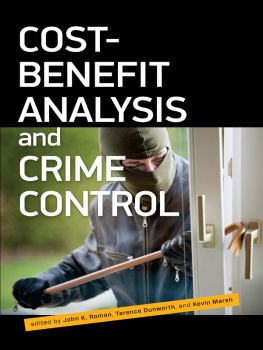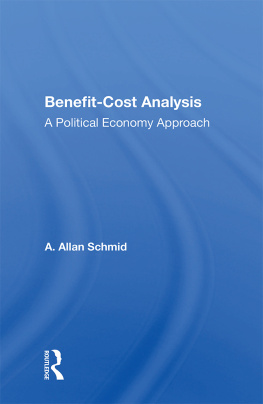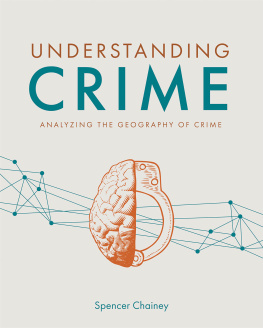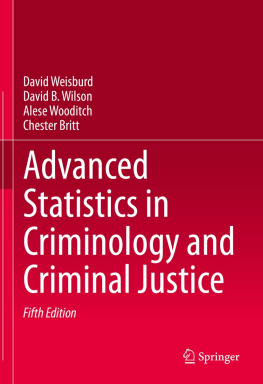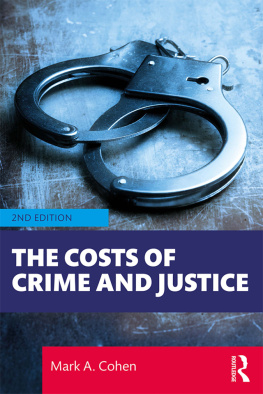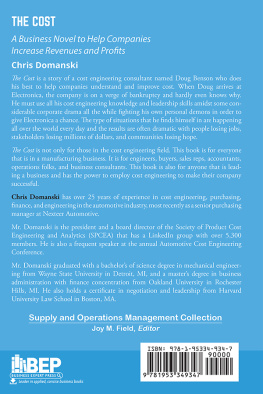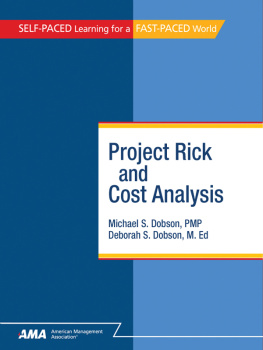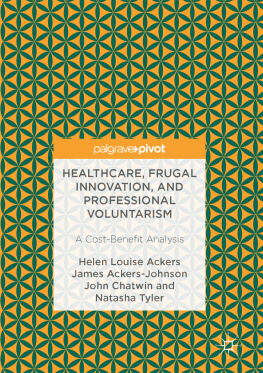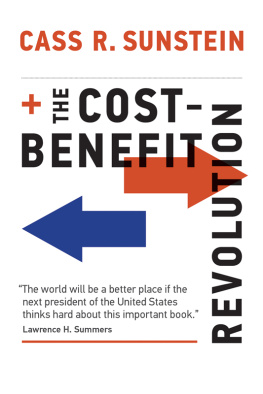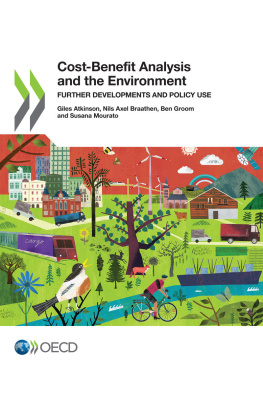About the Contributors
Roger Bowles is director of the Centre for Criminal Justice Economics and Psychology and professor of economics at the University of York. He has worked on a wide range of projects applying economic methodology in the criminal justice field. Recent research has included a project funded by the European Commission to develop methodology for policymakers interested in estimating the costs of crime and applying the results to the valuation of crime reduction or prevention programs.
Aaron J. Chalfin is a Ph.D. student in the Goldman School of Public Policy at the University of California, Berkeley. His research investigates a variety of topics relating to the economics of crime and punishment. Prior to that he was a research associate at the Urban Institute's Justice Policy Center, where his research focused on evaluations of criminal justice programs and the application of cost-benefit analysis to crime policy.
Mark A. Cohen is professor of management and law at Vanderbilt University. He previously served as a staff economist at the U.S. Environmental Protection Agency, the Federal Trade Commission, and the U.S. Sentencing Commission, and as chairman of the American Statistical Association's Committee on Law and Justice. Professor Cohen has published extensively on the costs of crime to victims and society, and has advised and lectured to government agencies around the world on criminal justice issues.
Paul Dolan is a professor in the Department of Social Policy at LSE, the London School of Economics and Political Science. There are two main themes to his work. The first focuses on developing measures of subjective well-being that can be used in policy, particularly in joining up the impact of changes in, for example, education, health, crime, or the environment. The second focuses on contributing to the evidence base and policy relevance of behavioral economics, particularly in relation to the important role that situational factors play in influencing behavior.
Ann Netten is professor of social welfare at the University of Kent and director of the Kent branch of the Personal Social Services Research Unit (PSSRU) and an associate director of the NIHR School for Social Care Research (SSCR). Her research interests include developing theoretically based but pragmatic approaches to the measurement of outcome, costs, and quality in social care, housing, and care of older people and economic evaluation of social welfare interventions, including criminal justice. She is a trustee for the Elderly Accommodation Counsel.
William Rhodes is a principal scientist and fellow at Abt Associates Inc. For the National Institute of Justice and the Office of National Drug Control Policy, Rhodes designed the sampling and analysis plans for the Arrestee Drug Abuse Monitoring (ADAM) survey. Other current projects include a five-year study to develop a benchmark system for the federal Administrative Office of the U.S. Courts (Office of Probation and Pretrial Services) and a three-year evaluation of the effectiveness of reduced probation caseloads and evidence-based practices.
About the Editors
John K. Roman is a senior research associate in the Justice Policy Center at the Urban Institute where his research focuses on evaluations of innovative crime control policies and justice programs. He is also the executive director of the District of Columbia Crime Policy Institute where he directs research on crime and justice matters on behalf of the Executive Office of the Mayor. Dr. Roman is directing studies of the use of DNA to aid law enforcement investigations, rates of wrongful conviction, prisoner reentry, drug courts, and the social benefit of informal social controls of postal carriers. He is coeditor with Jeffrey A. Butts of Juvenile Drug Courts and Teen Substance Abuse (Urban Institute Press, 2004) and has authored dozens of scholarly articles and book chapters. Dr. Roman also serves as a lecturer at the University of Pennsylvania and an affiliated professor at Georgetown University.
Terence Dunworth, Institute Fellow at the Urban Institute, is past director of the UI's Justice Policy Center. Dr. Dunworth, formerly managing vice president of Abt Associates Inc.'s Law and Public Policy Area, has directed evaluations of many national programs, including the Byrne Formula Grant Program, the Weed and Seed program, and the Youth Firearms Violence Initiative. Before joining Abt Associates, he was senior operations research specialist in the Social Policy Department at RAND. He also has served as a consultant to, among others, the World Bank and the states of California and Michigan for criminal justice programs and planning. Dr. Dunworth earned his Ph.D. in political science from Michigan State University.
Kevin Marsh is a director and chief economist at the Matrix Knowledge Group, with responsibility for economic evaluations of public policy, in particular criminal justice and public health interventions. He completed his Ph.D. in economics at the University of Bath. Dr. Marsh joined Matrix in 2003 following a year at the Social Disadvantage Research Centre at Oxford University. His research interests are in methods for the economic evaluations of public policy. He has undertaken economic evaluations on behalf of European and UK-based clients including the European Commission, the Ministry of Justice, the Department of Health, and the National Institute for Health and Clinical Excellence. He is an active member of the Campbell and Cochrane Economic Methods Group.
BOARD OF TRUSTEES
Joel L. Fleishman, Chairman
Robert M. Solow, Vice Chairman
Robert D. Reischauer, President
J. Adam Abram
Afsaneh Beschloss
Jamie S. Gorelick
Richard C. Green Jr.
Fernando A. Guerra MD
Freeman A. Hrabowski III
Charles L. Mee Jr.
Annette L. Nazareth
Melvin L. Oliver
Joshua B. Rales
Jeremy Travis
Anthony A. Williams
Judy Woodruff
LIFE TRUSTEES
Joan T. Bok
Warren E. Buffett
James E. Burke
Joseph A. Califano Jr.
Marcia L. Carsey
Carol Thompson Cole
William T. Coleman Jr.
John M. Deutch
Anthony Downs
George J. W. Goodman
William Gorham
Aileen C. Hernandez
Carla A. Hills
Vernon E. Jordan Jr.
Bayless A. Manning
David O. Maxwell
Arjay Miller
Robert C. Miller
Lois D. Rice
William D. Ruckelshaus
Herbert E. Scarf
Charles L. Schultze
William W. Scranton
Louis A. Simpson
Dick Thornburgh
Mortimer B. Zuckerman

THE URBAN INSTITUTE is a nonprofit, nonpartisan policy research and educational organization established in Washington, D.C., in 1968. Its staff investigates the social, economic, and governance problems confronting the nation and evaluates the public and private means to alleviate them. The Institute disseminates its research findings through publications, its web site, the media, seminars, and forums.
Through work that ranges from broad conceptual studies to administrative and technical assistance, Institute researchers contribute to the stock of knowledge available to guide decisionmaking in the public interest.
Conclusions or opinions expressed in Institute publications are those of the authors and do not necessarily reflect the views of officers or trustees of the Institute, advisory groups, or any organizations that provide financial support to the Institute.
Next page
